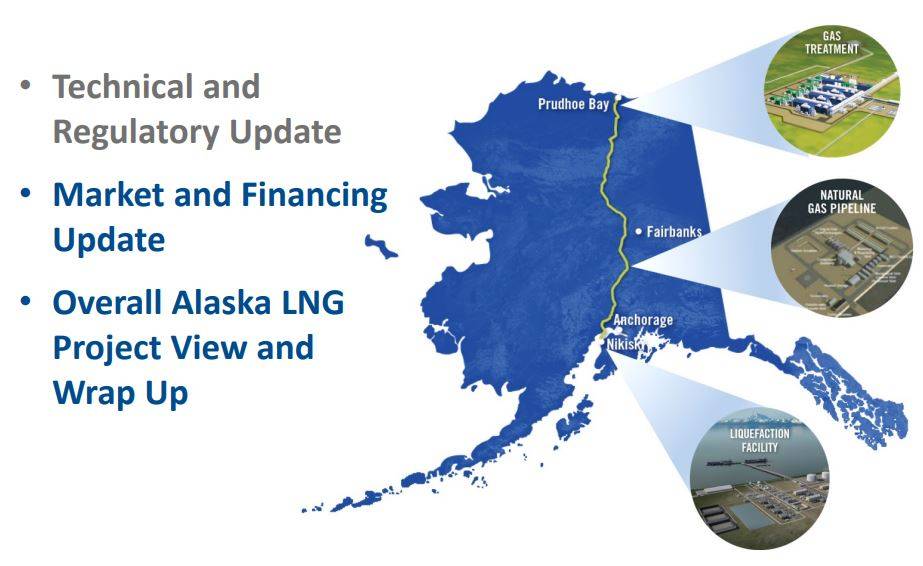Correction: The proposed pipeline would be 807 miles, not 907 miles.
The multibillion-dollar trans-Alaska natural gas pipeline project is still advancing, state lawmakers were told in a Wednesday morning hearing.
At a regular quarterly update in Anchorage, executives from the Alaska Gasline Development Corporation told legislators they are working on contracts with potential gas customers in Asia.
The corporation has 15 “letters of interest” from customers, and it is trying to turn those into “definitive agreements,” AGDC President Keith Meyer told reporters before Wednesday’s hearing. Meyer was meeting with potential investors and did not participate in the hearing.
Sen. Cathy Giessel, R-Anchorage, and Rep. Geran Tarr, D-Anchorage, chaired Wednesday’s meeting, and each said they didn’t hear anything particularly groundbreaking from Wednesday’s presentation, which included information from AGDC as well as the Alaska Department of Revenue and the Alaska Department of Natural Resources.
According to the latest figures presented at Wednesday’s meeting, the AKLNG (Alaska Liquefied Natural Gas) project would spend $44 billion to construct a 807-mile pipeline bracketed by a pair of massive industrial plants. At the southern end, in the Kenai Peninsula community of Nikiski, would be a facility designed to export the gas onto tankers bound for ports in Asia.
The plan, which is being pushed by Gov. Bill Walker as a successor to efforts started by former governors Sarah Palin and Sean Parnell, is the latest iteration of ideas that have been on the table since the trans-Alaska Pipeline System began shipping crude oil 41 years ago.
The AGDC, a state-owned corporation, is in charge of developing the project. That includes negotiating contracts with gas providers (North Slope oil companies) and gas buyers (utilities in Asia). With those deals in hand, the state would be able to find investors to fund construction of the project. When the pipeline begins operation, the plan calls for those investors to be paid off over a period of 20-30 years, leaving the state with full ownership.
While a gas pipeline has been a political issue since the 1970s, Department of Revenue deputy commissioner Mike Barnhill told lawmakers, “We may be at that point where we seriously consider how we do this.”
AGDC representatives provided an update on the multi-year federal permitting process and said they have found an American supplier for the steel pipe that may be used in the project. That matters because recent tariffs imposed by President Donald Trump on imported steel pipe had threatened to increase the cost of the pipeline.
“That’s a very good positive,” AGDC vice president Frank Richards said of the American supplier, “because previously we didn’t see that there was 42-inch (pipe) being rolled in the United States.”
Lawmakers are keeping a close eye on the project because the state is likely to shoulder a one-quarter share of construction costs. At $44 billion, that would mean an $11 billion payment.
The Alaska Permanent Fund is not seriously considering an investment at present, lawmakers were told.
Sens. Click Bishop, R-Fairbanks, and Bert Stedman, R-Sitka, each said that it will be absolutely critical for the state to be accurate with its cost estimates. Construction of the trans-Alaska oil pipeline system was three times as expensive as forecast, and a state-owned gas pipeline cannot do that.
“I don’t mind betting the cow,” Stedman said. “There’s no way I’m betting the farm.”
• Contact reporter James Brooks at jbrooks@juneauempire.com or 523-2258.

